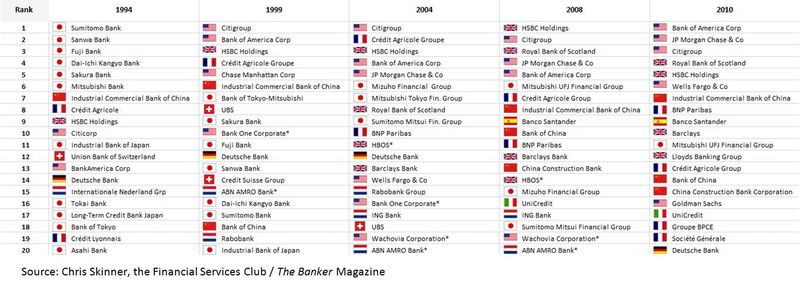
I’ve just received this month’s Banker magazine which the editor, Brian Caplen, describes as their most important issue of the year as it covers the latest Bank 1000 listings.
This year’s listings show a surprisingly stable crew of American and British banks.
World Bank Tier One Pre-tax
Rank Capital profit
$m $m
1 Bank of America Corp 160,387.77 4,360.00
2 JP Morgan Chase & Co 132,971.00 16,143.00
3 Citigroup 127,034.00 -8,445.00
4 Royal Bank of Scotland 123,859.00 -4,366.29
5 HSBC Holdings 122,157.00 7,079.00
Considering the crisis was meant to have killed these banks, you may find it surprising to see that Citigroup and RBS have maintained their leading positions.
This is down to the fact that the Banker measures a bank’s strength by its Tier 1 Capital, and so their positioning is more of a reflection of the sheer size of these firms than by their brand or market capitalisation, which is used in some other studies of size.
The Banker’s data is fascinating though, as the database also contains profitability, revenue, cost-income ratio and more, so it’s a useful tool in all senses. And the online data goes back to 1996, so you can do some useful comparisons.
Mind you, my data - old Banker magazines - goes back even further so I quickly took a snapshot of a few useful year’s – 1994, 1999, 2004, 2008 and 2010 – to see how things have changed. Mapping out the Top 20 banks of the world for each year makes for an interesting picture (doubleclick the picture to see a larger version):
Back in 1994, Japan ruled the world.
Then their economy went South and Origami Bank folded, Sumo Bank went belly up, Bonsai Bank cut back their branches and something fishy went on at Sushi Bank where staff got a raw deal.
Post-Japan’s slump, the Anglo-American financial system ruled. So you would think that, as that system failed, it also would have gone South.
Not the case.
Maybe that’s a reflection of the sheer scale of investment American and European firms have put into these economies to avoid such a crash.
Well worth spending time looking at the data and looking forward to playing around with it further.
Chris M Skinner
Chris Skinner is best known as an independent commentator on the financial markets through his blog, TheFinanser.com, as author of the bestselling book Digital Bank, and Chair of the European networking forum the Financial Services Club. He has been voted one of the most influential people in banking by The Financial Brand (as well as one of the best blogs), a FinTech Titan (Next Bank), one of the Fintech Leaders you need to follow (City AM, Deluxe and Jax Finance), as well as one of the Top 40 most influential people in financial technology by the Wall Street Journal's Financial News. To learn more click here...

